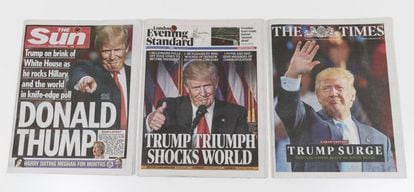The trinity of fear
Trump knows what our most basic emotion is, and was able to play on it

Without meaning to, Barack Obama put his finger on the key to Donald Trump’s electoral triumph, identifying along the way why Brexit won in the UK referendum and why the “no” vote triumphed in the plebiscite on the Colombian peace accord. Politicians of the world, take note.
Speaking in July this year, President Obama accused the now President-Elect Trump of stirring “fears that don’t have a basis in fact.” If Obama thought he was going to persuade Trump to abandon his one and only electoral strategy, he was mistaken. Trump is no sophisticate, but if there’s one thing he understands – as do former Colombian president Álvaro Uribe, the chief driver of Colombia’s “no” to peace, and Nigel Farage, Mr Brexit – it is this: fear is the most primary of the human impulses and the easiest to stir up; spreading fear through lies and then declaring oneself to be the one leader capable of extinguishing that fear, is the winning electoral formula in these times in which we live.
Trump is no sophisticate, but if there’s one thing he understands it is this: fear is the most primary of the human impulses and the easiest to stir up
The unspoken premise has inevitably to be a lack of respect for the political intelligence of the audience one aspires to win over. People are easily manipulated. You cry wolf and they start running – straight into the arms of the self-appointed redeemer who sounded the false alarm in the first place.
What matters is to have a finger on the popular pulse; to be able to identify which particular wolf happens at any given time to be perceived as the most fearful threat.
For Trump and Farage, it was immigrants, those who purportedly spread crime, take our jobs, and threaten our way of life. It doesn’t matter if the facts show otherwise. Such arguments convince not because of their substance, but because they appeal in a visceral way to people’s hatred or rejection of “the other,” of the unknown. In this case we are talking fear in its classic, xenophobic, racist or tribal variations.
Colombia’s former president Uribe turned to another classic: communism. A far more talented populist than either Trump or Farage, Uribe pulled off the feat of convincing a narrow majority of his compatriots that voting for the peace accord would mean handing the country over to the “Castro-Chavista” guerrillas of the FARC. Despite the fact that the FARC are rejected by 90% of Colombians or more, the plebiscite’s winning idea was that if they were allowed to participate in national politics, as the accord contemplated, they would win the next elections and communism would rule the land.
Hitler understood all this very well. In his case the enemy were the Jews. In today’s Europe many are gaining political support by inciting fear against Muslims. Be warned. This is only the beginning.












































